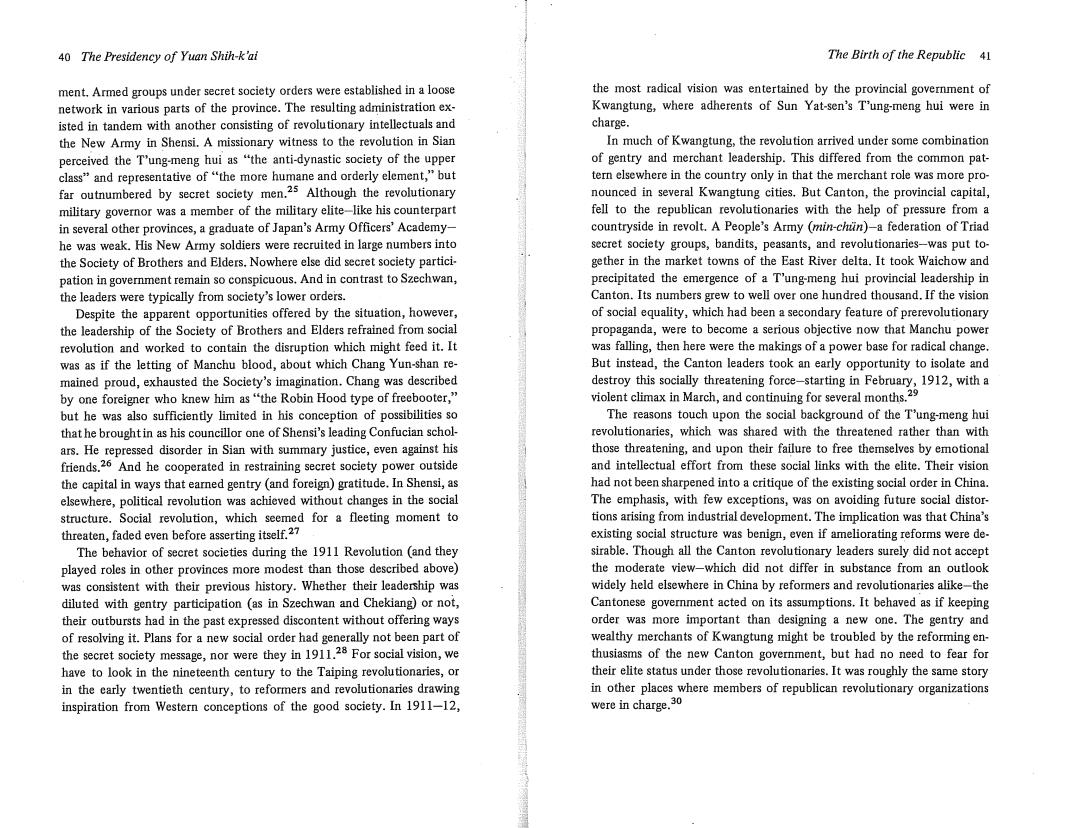
40 The Presidency of Yuan Shih-k'ai The Birth of the Republic 41 ment.Armed groups under secret society orders were established in a loose the most radical vision was entertained by the provincial government of network in various parts of the province.The resulting administration ex- Kwangtung,where adherents of Sun Yat-sen's T'ung-meng hui were in isted in tandem with another consisting of revolutionary intellectuals and charge. the New Army in Shensi.A missionary witness to the revolution in Sian In much of Kwangtung,the revolution arrived under some combination perceived the T'ung-meng hui as "the anti-dynastic society of the upper of gentry and merchant leadership.This differed from the common pat- class"and representative of "the more humane and orderly element,"but tern elsewhere in the country only in that the merchant role was more pro- far outnumbered by secret society men.25 Although the revolutionary nounced in several Kwangtung cities.But Canton,the provincial capital, military governor was a member of the military elite-like his counterpart fell to the republican revolutionaries with the help of pressure from a in several other provinces,a graduate of Japan's Army Officers'Academy- countryside in revolt.A People's Army (min-chiin)-a federation of Triad he was weak.His New Army soldiers were recruited in large numbers into secret society groups,bandits,peasants,and revolutionaries-was put to- the Society of Brothers and Elders.Nowhere else did secret society partici- gether in the market towns of the East River delta.It took Waichow and pation in government remain so conspicuous.And in contrast to Szechwan, precipitated the emergence of a T'ung-meng hui provincial leadership in the leaders were typically from society's lower orders. Canton.Its numbers grew to well over one hundred thousand.If the vision Despite the apparent opportunities offered by the situation,however, of social equality,which had been a secondary feature of prerevolutionary the leadership of the Society of Brothers and Elders refrained from social propaganda,were to become a serious objective now that Manchu power revolution and worked to contain the disruption which might feed it.It was falling,then here were the makings of a power base for radical change. was as if the letting of Manchu blood,about which Chang Yun-shan re- But instead,the Canton leaders took an early opportunity to isolate and mained proud,exhausted the Society's imagination.Chang was described destroy this socially threatening force-starting in February,1912,with a by one foreigner who knew him as"the Robin Hood type of freebooter," violent climax in March,and continuing for several months.29 but he was also sufficiently limited in his conception of possibilities so The reasons touch upon the social background of the T'ung-meng hui that he broughtin as his councillor one of Shensi's leading Confucian schol- revolutionaries,which was shared with the threatened rather than with ars.He repressed disorder in Sian with summary justice,even against his those threatening,and upon their failure to free themselves by emotional friends.26 And he cooperated in restraining secret society power outside and intellectual effort from these social links with the elite.Their vision the capital in ways that earned gentry(and foreign)gratitude.In Shensi,as had not been sharpened into a critique of the existing social order in China. elsewhere,political revolution was achieved without changes in the social The emphasis,with few exceptions,was on avoiding future social distor- structure.Social revolution,which seemed for a fleeting moment to tions arising from industrial development.The implication was that China's threaten,faded even before asserting itself.27 existing social structure was benign,even if ameliorating reforms were de- The behavior of secret societies during the 1911 Revolution (and they sirable.Though all the Canton revolutionary leaders surely did not accept played roles in other provinces more modest than those described above) the moderate view-which did not differ in substance from an outlook was consistent with their previous history.Whether their leadership was widely held elsewhere in China by reformers and revolutionaries alike-the diluted with gentry participation(as in Szechwan and Chekiang)or not, Cantonese government acted on its assumptions.It behaved as if keeping their outbursts had in the past expressed discontent without offering ways order was more important than designing a new one.The gentry and of resolving it.Plans for a new social order had generally not been part of wealthy merchants of Kwangtung might be troubled by the reforming en- the secret society message,nor were they in 1911.28 For social vision,we thusiasms of the new Canton government,but had no need to fear for have to look in the nineteenth century to the Taiping revolutionaries,or their elite status under those revolutionaries.It was roughly the same story in the early twentieth century,to reformers and revolutionaries drawing in other places where members of republican revolutionary organizations inspiration from Western conceptions of the good society.In 1911-12, were in charge.30
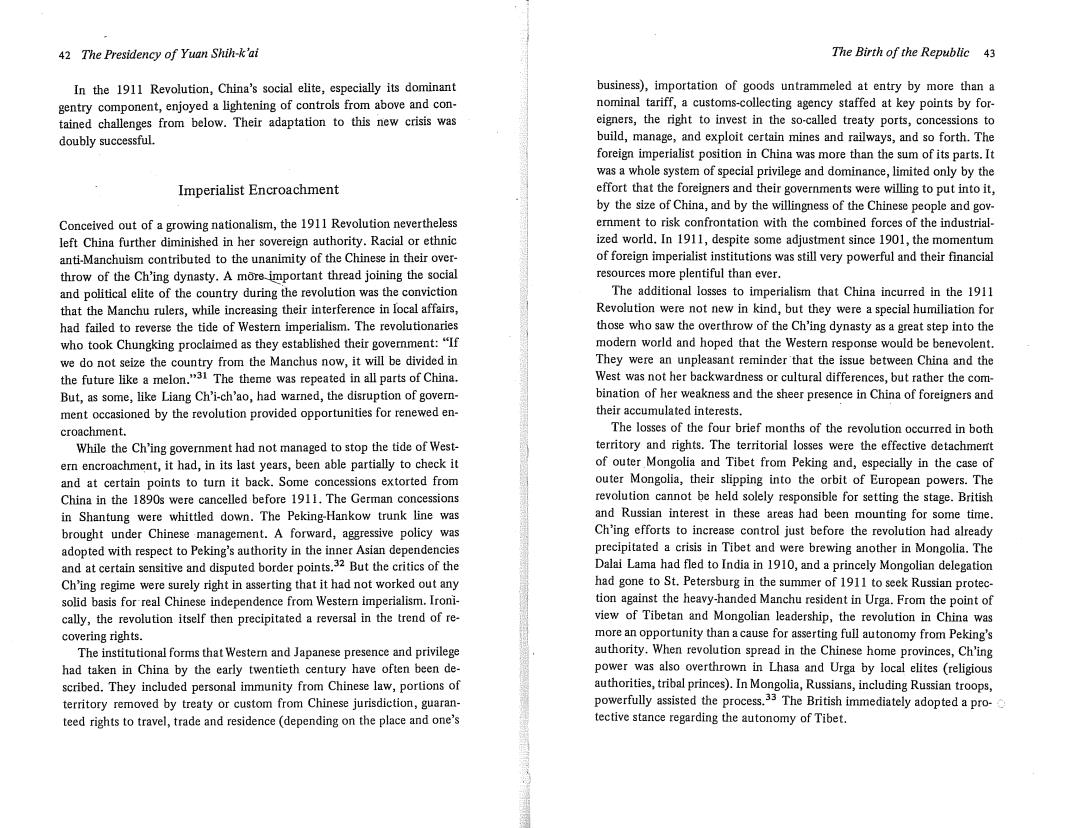
42 The Presidency of Yuan Shih-k'ai The Birth of the Republic 43 In the 1911 Revolution,China's social elite,especially its dominant business),importation of goods untrammeled at entry by more than a gentry component,enjoyed a lightening of controls from above and con- nominal tariff,a customs-collecting agency staffed at key points by for- tained challenges from below.Their adaptation to this new crisis was eigners,the right to invest in the so-called treaty ports,concessions to doubly successful. build,manage,and exploit certain mines and railways,and so forth.The foreign imperialist position in China was more than the sum of its parts.It was a whole system of special privilege and dominance,limited only by the Imperialist Encroachment effort that the foreigners and their governments were willing to put into it, by the size of China,and by the willingness of the Chinese people and gov- Conceived out of a growing nationalism,the 1911 Revolution nevertheless ernment to risk confrontation with the combined forces of the industrial- left China further diminished in her sovereign authority.Racial or ethnic ized world.In 1911,despite some adjustment since 1901,the momentum anti-Manchuism contributed to the unanimity of the Chinese in their over- of foreign imperialist institutions was still very powerful and their financial throw of the Ch'ing dynasty.A more important thread joining the social resources more plentiful than ever. and political elite of the country during the revolution was the conviction The additional losses to imperialism that China incurred in the 1911 that the Manchu rulers,while increasing their interference in local affairs, Revolution were not new in kind,but they were a special humiliation for had failed to reverse the tide of Western imperialism.The revolutionaries those who saw the overthrow of the Ch'ing dynasty as a great step into the who took Chungking proclaimed as they established their government:"If modern world and hoped that the Western response would be benevolent. we do not seize the country from the Manchus now,it will be divided in They were an unpleasant reminder that the issue between China and the the future like a melon."31 The theme was repeated in all parts of China. West was not her backwardness or cultural differences,but rather the com- But,as some,like Liang Ch'i-ch'ao,had warned,the disruption of govern- bination of her weakness and the sheer presence in China of foreigners and ment occasioned by the revolution provided opportunities for renewed en- their accumulated interests. croachment. The losses of the four brief months of the revolution occurred in both While the Ch'ing government had not managed to stop the tide of West- territory and rights.The territorial losses were the effective detachment ern encroachment,it had,in its last years,been able partially to check it of outer Mongolia and Tibet from Peking and,especially in the case of and at certain points to turn it back.Some concessions extorted from outer Mongolia,their slipping into the orbit of European powers.The China in the 1890s were cancelled before 1911.The German concessions revolution cannot be held solely responsible for setting the stage.British in Shantung were whittled down.The Peking-Hankow trunk line was and Russian interest in these areas had been mounting for some time. brought under Chinese management.A forward,aggressive policy was Ch'ing efforts to increase control just before the revolution had already adopted with respect to Peking's authority in the inner Asian dependencies precipitated a crisis in Tibet and were brewing another in Mongolia.The and at certain sensitive and disputed border points.32 But the critics of the Dalai Lama had fled to India in 1910,and a princely Mongolian delegation Ch'ing regime were surely right in asserting that it had not worked out any had gone to St.Petersburg in the summer of 1911 to seek Russian protec- solid basis for real Chinese independence from Western imperialism.Ironi- tion against the heavy-handed Manchu resident in Urga.From the point of cally,the revolution itself then precipitated a reversal in the trend of re- view of Tibetan and Mongolian leadership,the revolution in China was covering rights. more an opportunity than a cause for asserting full autonomy from Peking's The institutional forms that Western and Japanese presence and privilege authority.When revolution spread in the Chinese home provinces,Ch'ing had taken in China by the early twentieth century have often been de- power was also overthrown in Lhasa and Urga by local elites (religious scribed.They included personal immunity from Chinese law,portions of authorities,tribal princes).In Mongolia,Russians,including Russian troops, territory removed by treaty or custom from Chinese jurisdiction,guaran- powerfully assisted the process.33 The British immediately adopted a pro- teed rights to travel,trade and residence(depending on the place and one's tective stance regarding the autonomy of Tibet
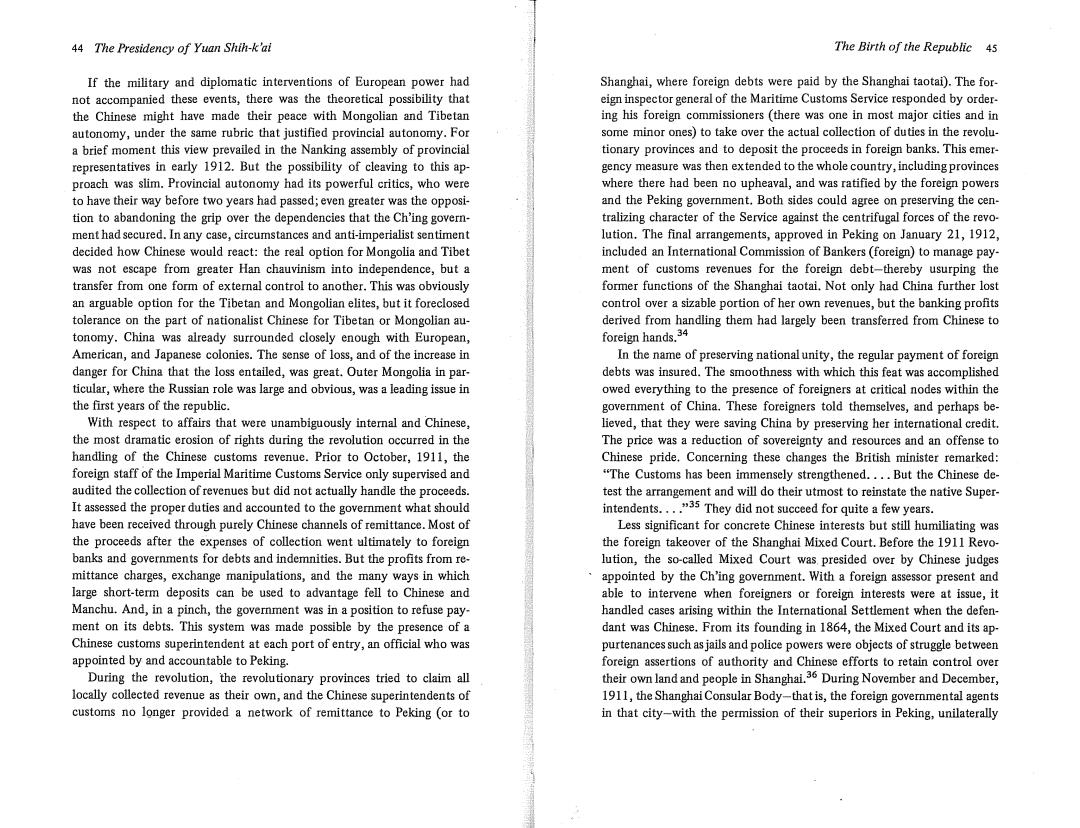
44 The Presidency of Yuan Shih-k'ai The Birth of the Republic 45 If the military and diplomatic interventions of European power had Shanghai,where foreign debts were paid by the Shanghai taotai).The for- not accompanied these events,there was the theoretical possibility that eign inspector general of the Maritime Customs Service responded by order- the Chinese might have made their peace with Mongolian and Tibetan ing his foreign commissioners (there was one in most major cities and in autonomy,under the same rubric that justified provincial autonomy.For some minor ones)to take over the actual collection of duties in the revolu- a brief moment this view prevailed in the Nanking assembly of provincial tionary provinces and to deposit the proceeds in foreign banks.This emer- representatives in early 1912.But the possibility of cleaving to this ap- gency measure was then extended to the whole country,including provinces proach was slim.Provincial autonomy had its powerful critics,who were where there had been no upheaval,and was ratified by the foreign powers to have their way before two years had passed;even greater was the opposi- and the Peking government.Both sides could agree on preserving the cen- tion to abandoning the grip over the dependencies that the Ch'ing govern- tralizing character of the Service against the centrifugal forces of the revo- ment had secured.In any case,circumstances and anti-imperialist sentiment lution.The final arrangements,approved in Peking on January 21,1912, decided how Chinese would react:the real option for Mongolia and Tibet included an International Commission of Bankers (foreign)to manage pay- was not escape from greater Han chauvinism into independence,but a ment of customs revenues for the foreign debt-thereby usurping the transfer from one form of external control to another.This was obviously former functions of the Shanghai taotai.Not only had China further lost an arguable option for the Tibetan and Mongolian elites,but it foreclosed control over a sizable portion of her own revenues,but the banking profits tolerance on the part of nationalist Chinese for Tibetan or Mongolian au- derived from handling them had largely been transferred from Chinese to tonomy.China was already surrounded closely enough with European, foreign hands.34 American,and Japanese colonies.The sense of loss,and of the increase in In the name of preserving national unity,the regular payment of foreign danger for China that the loss entailed,was great.Outer Mongolia in par- debts was insured.The smoothness with which this feat was accomplished ticular,where the Russian role was large and obvious,was a leading issue in owed everything to the presence of foreigners at critical nodes within the the first years of the republic. government of China.These foreigners told themselves,and perhaps be- With respect to affairs that were unambiguously internal and Chinese, lieved,that they were saving China by preserving her international credit. the most dramatic erosion of rights during the revolution occurred in the The price was a reduction of sovereignty and resources and an offense to handling of the Chinese customs revenue.Prior to October,1911,the Chinese pride.Concerning these changes the British minister remarked: foreign staff of the Imperial Maritime Customs Service only supervised and "The Customs has been immensely strengthened....But the Chinese de- audited the collection of revenues but did not actually handle the proceeds. test the arrangement and will do their utmost to reinstate the native Super- It assessed the proper duties and accounted to the goverment what should intendents..."35 They did not succeed for quite a few years. have been received through purely Chinese channels of remittance.Most of Less significant for concrete Chinese interests but still humiliating was the proceeds after the expenses of collection went ultimately to foreign the foreign takeover of the Shanghai Mixed Court.Before the 1911 Revo- banks and governments for debts and indemnities.But the profits from re- lution,the so-called Mixed Court was.presided over by Chinese judges mittance charges,exchange manipulations,and the many ways in which appointed by the Ch'ing government.With a foreign assessor present and large short-term deposits can be used to advantage fell to Chinese and able to intervene when foreigners or foreign interests were at issue,it Manchu.And,in a pinch,the government was in a position to refuse pay- handled cases arising within the International Settlement when the defen- ment on its debts.This system was made possible by the presence of a dant was Chinese.From its founding in 1864,the Mixed Court and its ap- Chinese customs superintendent at each port of entry,an official who was purtenances such as jails and police powers were objects of struggle between appointed by and accountable to Peking. foreign assertions of authority and Chinese efforts to retain control over During the revolution,the revolutionary provinces tried to claim all their own land and people in Shanghai.36 During November and December, locally collected revenue as their own,and the Chinese superintendents of 1911,the Shanghai Consular Body-that is,the foreign governmental agents customs no longer provided a network of remittance to Peking (or to in that city-with the permission of their superiors in Peking,unilaterally
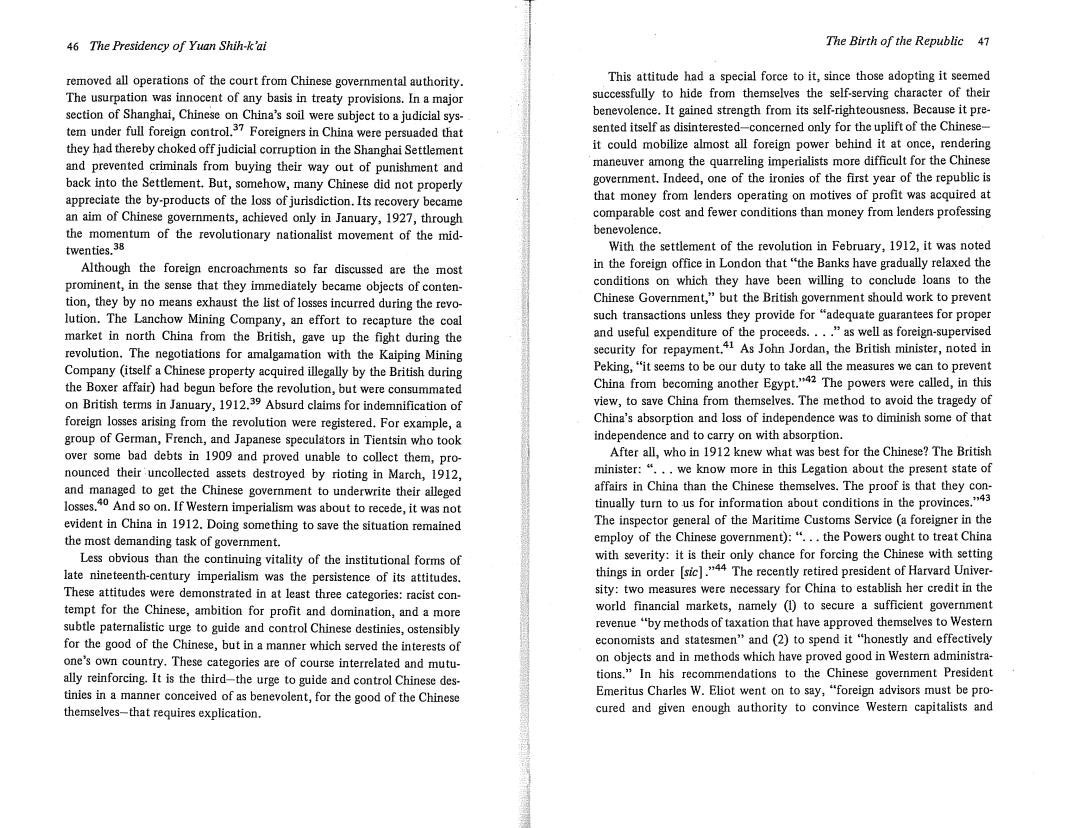
46 The Presidency of Yuan Shih-k'ai The Birth of the Republic 47 removed all operations of the court from Chinese governmental authority. This attitude had a special force to it,since those adopting it seemed The usurpation was innocent of any basis in treaty provisions.In a major successfully to hide from themselves the self-serving character of their section of Shanghai,Chinese on China's soil were subject to a judicial sys- benevolence.It gained strength from its self-righteousness.Because it pre- tem under full foreign control.37 Foreigners in China were persuaded that sented itself as disinterested-concerned only for the uplift of the Chinese- they had thereby choked off judicial corruption in the Shanghai Settlement it could mobilize almost all foreign power behind it at once,rendering and prevented criminals from buying their way out of punishment and maneuver among the quarreling imperialists more difficult for the Chinese back into the Settlement.But,somehow,many Chinese did not properly government.Indeed,one of the ironies of the first year of the republic is appreciate the by-products of the loss of jurisdiction.Its recovery became that money from lenders operating on motives of profit was acquired at an aim of Chinese governments,achieved only in January,1927,through comparable cost and fewer conditions than money from lenders professing the momentum of the revolutionary nationalist movement of the mid- benevolence. twenties.38 With the settlement of the revolution in February,1912,it was noted Although the foreign encroachments so far discussed are the most in the foreign office in London that"the Banks have gradually relaxed the prominent,in the sense that they immediately became objects of conten- conditions on which they have been willing to conclude loans to the tion,they by no means exhaust the list of losses incurred during the revo- Chinese Government,"but the British government should work to prevent lution.The Lanchow Mining Company,an effort to recapture the coal such transactions unless they provide for"adequate guarantees for proper market in north China from the British,gave up the fight during the and useful expenditure of the proceeds...."as well as foreign-supervised revolution.The negotiations for amalgamation with the Kaiping Mining security for repayment.As John Jordan,the British minister,noted in Company (itself a Chinese property acquired illegally by the British during Peking,"it seems to be our duty to take all the measures we can to prevent the Boxer affair)had begun before the revolution,but were consummated China from becoming another Egypt."42 The powers were called,in this on British terms in January,1912.39 Absurd claims for indemnification of view,to save China from themselves.The method to avoid the tragedy of foreign losses arising from the revolution were registered.For example,a China's absorption and loss of independence was to diminish some of that group of German,French,and Japanese speculators in Tientsin who took independence and to carry on with absorption. over some bad debts in 1909 and proved unable to collect them,pro- After all,who in 1912 knew what was best for the Chinese?The British nounced their uncollected assets destroyed by rioting in March,1912, minister:"..we know more in this Legation about the present state of and managed to get the Chinese government to underwrite their alleged affairs in China than the Chinese themselves.The proof is that they con- losses.40 And so on.If Western imperialism was about to recede,it was not tinually tu tous for information about conditions in the provinces.3 evident in China in 1912.Doing something to save the situation remained The inspector general of the Maritime Customs Service (a foreigner in the the most demanding task of government. employ of the Chinese government):"...the Powers ought to treat China Less obvious than the continuing vitality of the institutional forms of with severity:it is their only chance for forcing the Chinese with setting late nineteenth-century imperialism was the persistence of its attitudes. things in order [sic]44 The recently retired president of Harvard Univer- These attitudes were demonstrated in at least three categories:racist con- sity:two measures were necessary for China to establish her credit in the tempt for the Chinese,ambition for profit and domination,and a more world financial markets,namely (1)to secure a sufficient government subtle paternalistic urge to guide and control Chinese destinies,ostensibly revenue"by methods of taxation that have approved themselves to Western for the good of the Chinese,but in a manner which served the interests of economists and statesmen"and(2)to spend it "honestly and effectively one's own country.These categories are of course interrelated and mutu- on objects and in methods which have proved good in Western administra- ally reinforcing.It is the third-the urge to guide and control Chinese des- tions."In his recommendations to the Chinese government President tinies in a manner conceived of as benevolent,for the good of the Chinese Emeritus Charles W.Eliot went on to say,"foreign advisors must be pro- themselves-that requires explication. cured and given enough authority to convince Western capitalists and
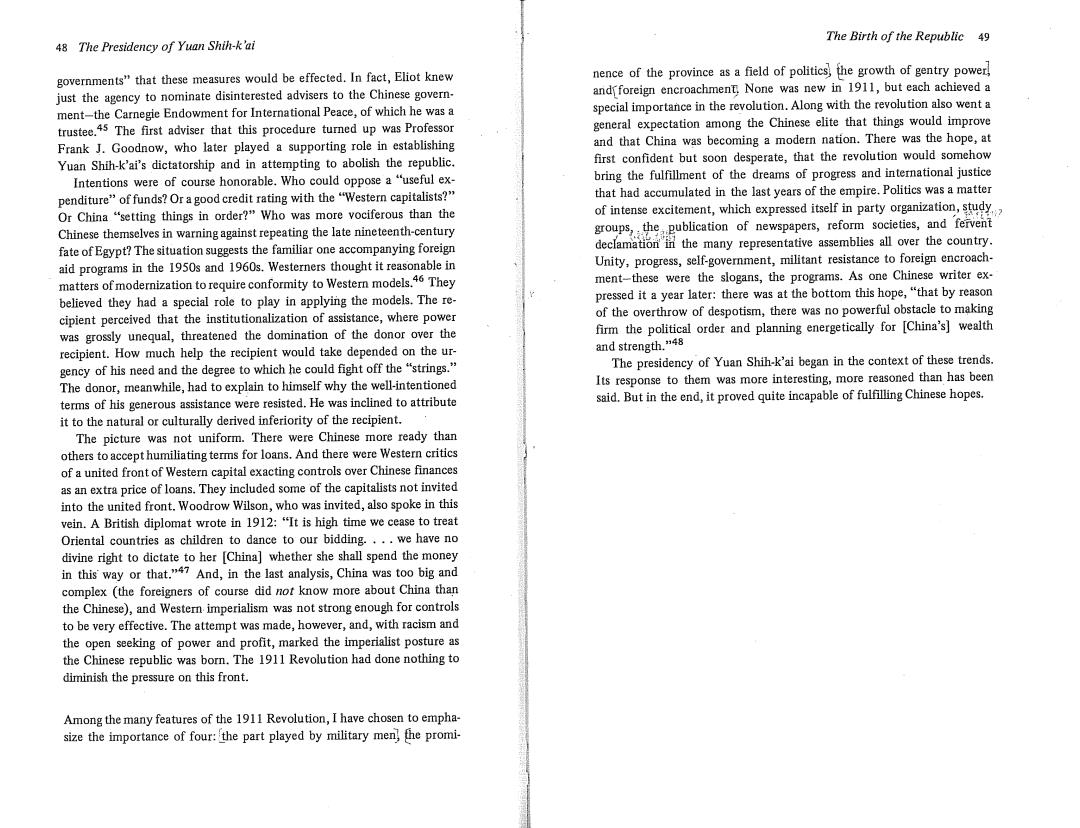
The Birth of the Republic 49 48 The Presidency of Yuan Shih-k'ai governments"that these measures would be effected.In fact,Eliot knew nence of the province as a field of politics,the growth of gentry power just the agency to nominate disinterested advisers to the Chinese govern- and foreign encroachment,None was new in 1911,but each achieved a ment-the Carnegie Endowment for International Peace,of which he was a special importance in the revolution.Along with the revolution also went a trustee.45 The first adviser that this procedure turned up was Professor general expectation among the Chinese elite that things would improve Frank J.Goodnow,who later played a supporting role in establishing and that China was becoming a modern nation.There was the hope,at Yuan Shih-k'ai's dictatorship and in attempting to abolish the republic. first confident but soon desperate,that the revolution would somehow Intentions were of course honorable.Who could oppose a"useful ex- bring the fulfillment of the dreams of progress and international justice penditure"of funds?Or a good credit rating with the "Western capitalists?" that had accumulated in the last years of the empire.Politics was a matter Or China "setting things in order?"Who was more vociferous than the of intense excitement,which expressed itself in party organization,study Chinese themselves in warning against repeating the late nineteenth-century groups,the publication of newspapers,reform societies,and fervent fate of Egypt?The situation suggests the familiar one accompanying foreign declamation in the many representative assemblies all over the country. aid programs in the 1950s and 1960s.Westerners thought it reasonable in Unity,progress,self-government,militant resistance to foreign encroach- matters ofmodernization to require conformity to Western models.46 They ment-these were the slogans,the programs.As one Chinese writer ex. believed they had a special role to play in applying the models.The re- pressed it a year later:there was at the bottom this hope,"that by reason cipient perceived that the institutionalization of assistance,where power of the overthrow of despotism,there was no powerful obstacle to making was grossly unequal,threatened the domination of the donor over the firm the political order and planning energetically for [China's]wealth recipient.How much help the recipient would take depended on the ur- and strength."48 gency of his need and the degree to which he could fight off the"strings." The presidency of Yuan Shih-k'ai began in the context of these trends. The donor,meanwhile,had to explain to himself why the well-intentioned Its response to them was more interesting,more reasoned than has been terms of his generous assistance were resisted.He was inclined to attribute said.But in the end,it proved quite incapable of fulfilling Chinese hopes. it to the natural or culturally derived inferiority of the recipient. The picture was not uniform.There were Chinese more ready than others to accept humiliating terms for loans.And there were Western critics of a united front of Western capital exacting controls over Chinese finances as an extra price of loans.They included some of the capitalists not invited into the united front.Woodrow Wilson,who was invited,also spoke in this vein.A British diplomat wrote in 1912:"It is high time we cease to treat Oriental countries as children to dance to our bidding....we have no divine right to dictate to her [China]whether she shall spend the money in this way or that.47 And,in the last analysis,China was too big and complex (the foreigners of course did not know more about China than the Chinese),and Western imperialism was not strong enough for controls to be very effective.The attempt was made,however,and,with racism and the open seeking of power and profit,marked the imperialist posture as the Chinese republic was born.The 1911 Revolution had done nothing to diminish the pressure on this front. Among the many features of the 1911 Revolution,I have chosen to empha- size the importance of four:the part played by military men the promi-